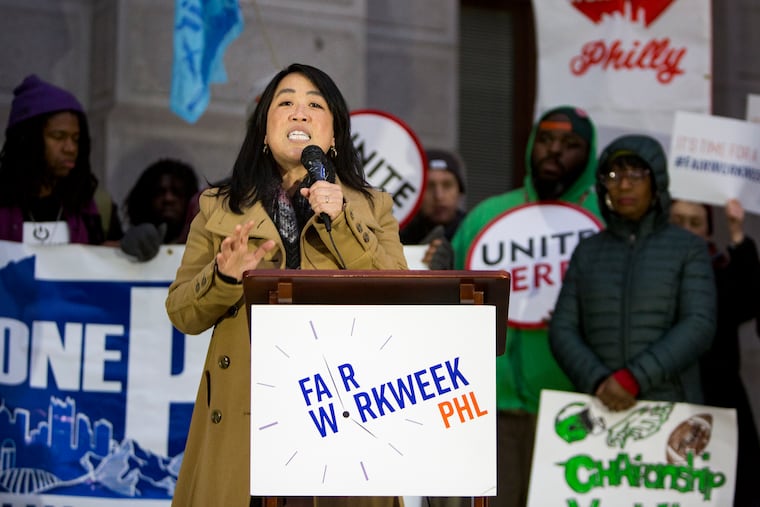When City Hall leans on Philly business, do workers win?
"Business-friendly" Texas added more than 300,000 jobs last year, Florida, gained 160,000, while Pennsylvania lost more than 25,000, according to the U.S. Census.

Is Philadelphia City Council a forward-looking group building a better day for working people? Or is it a public nuisance driving badly needed jobs out of the poorest big city in America?
Check out the latest Democratic labor proposal at City Hall — a "Fair Work Week" scheduling law that would require chain stores and chain restaurants to give workers two weeks notice of their hourly schedules. That has provoked the latest counter strike from the Republicans, whom Pennsylvania voters chose to run the legislature: They want to stop the state's 2,500 cities, boroughs, and townships from passing local labor laws.
State Rep. Seth Grove (R., York) plans a committee vote Sept. 12 on House Bill 861, which would erase municipal private-workplace rules.
Local laws cause "multiple human-relations problems and compliance issues," Grove told me. "It started with the paid-leave mandate. Now it's scheduling. There are so many policies driven at the local level. We need one standard and one operating model," or we'll end up like New York, with its multiple minimum-wage schedules, paid-leave and scheduling mandates, and "ungodly paperwork."
It's a luxury to have high-end labor policies, Grove said, especially when Pennsylvania has been losing industries to cheaper locations, and growing at half the national rate, since the Great Depression.
Like past state plans to stop Philadelphia from regulating guns, firearms, or tobacco, this movement doesn't represent a grassroots faith in Harrisburg wisdom over City Hall thinking. It's an effort by big businesses active in Philly, which feel taken for granted by the city's ruling Democrats, to use the suburban and small-town Harrisburg Republican majority as a brake on progressive tendencies.
The Chamber of Commerce of Greater Philadelphia supports Grove's bill, says vice president Liz Ferry. Local labor laws are "costly and onerous," and uncompetitive: They may drive companies to go elsewhere.
Who, I asked, has gone elsewhere because of recent city labor laws? "I don't have empirical evidence," admitted John Longstreet, president of the Pennsylvania Restaurant and Lodging Association. But it can't help that Philadelphia keeps adding requirements that Bensalem, King of Prussia, and Cherry Hill don't have, he said.
"Higher minimum wage? Mandated paid sick leave? Predictive scheduling? All these things become a part of the checklist," Longstreet said. "Philadelphia is a terrific city with an incredible food scene. But that can change if Philadelphia becomes a lot more costly than doing business elsewhere."
The Council member leading the scheduling bill campaign, Democrat Helen Gym, doesn't buy this. "New York has a rigorous 'fair-workweek' bill. They have a host of strong labor laws that set high standards that have proven beneficial to business as well as employees," she said. "I don't think those things are at odds. What can be good for workers and employers can be good for business."
I pointed out that New York and its nearest neighbors have lost jobs in the past year, and its fabled high housing costs are starting to fall, with fewer tenants needing to live there. Gym responded that progressive Boston, like Seattle, is still adding jobs quickly.
And she invoked home rule: "I just don't think state interference in local democracy is an answer." Who, she asked, represents the citizen better than elected local council members? "All municipalities are not the same," she added. "We are responding to the needs of our communities."
Philadelphia's bill is limited to large employers with 250 workers and 20 or more locations — Starbucks, McDonald's, Dollar General. That should exclude, say, locally based Comcast, with most of its people in downtown high rises.
Gym insisted that Council's labor law reformers know what's best for business: To compete with online retailers, the store visitor "needs to feel valued. Having people work recognizable, experienced, more-stable schedules will improve the customer experience." And that's "smart for business, smart for workers, a healthy environment."
If this is so helpful, why do we need to force them to do it? "We're trying to set a floor," which would make it easier for businesses that want to do the right thing, Gym said.
She used Pennsylvania's conservatism to cap her argument: Low outstate wages and a lack of labor mandates, whatever that's done for Texas or Florida, "haven't sparked growth in the rest of this state." And, "nationally, corporate profits are soaring," but wages aren't.
As if to conclude: What good is government if it can't get more people a bigger share of the action from those profitable employers that remain in town?
(In comparing employment levels in Philadelphia and other cities, earlier versions of this story wrongly used total-workforce data, instead of employment data. That data has been removed from this posted version.)